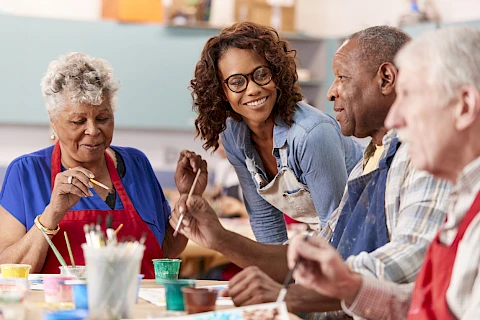
September is Self-Improvement Month, the perfect time for seniors to explore new skills and hobbies. Lifelong learning isn't just for young people; it's beneficial for older adults too. Engaging in new activities can bring numerous benefits. Senior Helpers shares why acquiring new skills is significant for seniors and some ideas to get you started.
Cognitive Benefits of Learning New Skills
Getting a new skill can do wonders for your brain. When you challenge your mind by learning something new, you help keep it sharp. Activities that require mental effort, like learning a new language or solving puzzles, can enhance your memory and cognitive abilities. Studies show that staying mentally active can reduce the risk of dementia and Alzheimer's disease. Activities that stimulate your brain, such as reading or playing strategy games, help build cognitive reserve, which can delay the onset of these conditions.
Learning new skills can also positively impact your mental health. Engaging in enjoyable activities can reduce stress and improve your mood. The sense of accomplishment from mastering a new skill can boost your self-esteem and keep you motivated.
Ideas for Acquiring New Skills and Hobbies
There are many ways seniors can learn new skills, including taking a class and learning a musical instrument.
Take a Class
Subscribing to a class is an excellent option. Many community centers and senior programs offer classes specifically designed for older adults. These can range from art and craft workshops to cooking and fitness classes. Joining a local class not only offers learning opportunities but also a chance to socialize. If you prefer learning from the comfort of your home, online courses and webinars are excellent options. Websites like Coursera, Udemy, and even YouTube offer a wide range of courses on any subject you can imagine.
Join a Club
Being part of a club can be a great way to meet new people and learn new skills. Whether it's a book club, gardening group, or knitting circle, there's something for everyone. Social clubs can provide structure and regularity to your learning. Volunteering is another way to learn new skills. Many organizations offer training for their volunteers, which can range from event planning to peer counseling. Plus, volunteering gives you the chance to give back to your community.
Learn an Instrument
Picking a new musical instrument offers multiple cognitive benefits. It can improve hand-eye coordination, enhance memory, and increase concentration. Music also has therapeutic effects, helping to reduce stress and improve emotional well-being. If you've never played an instrument before, don't worry. Many resources are available for beginners. You can find online tutorials, instructional books, and even local music schools that offer lessons for seniors.
Practical Tips for Getting Started
Feeling motivated to start learning something new? Here are some practical tips to help you begin:
- Set realistic goals. Start small to avoid feeling overwhelmed. For example, if you want to learn painting, begin with basic sketches before moving onto more complex pieces.
- Find local resources in your community. Libraries often offer free classes and workshops. Check out senior centers in nearby cities for programs tailored to seniors.
- Encourage support from family and friends: Share your learning goals with loved ones. Their encouragement can motivate you to stick with your new hobby. They might even join you on this learning journey!
Improve Yourself With the Help of Senior Helpers Worcester
Lifelong learning offers numerous benefits for seniors, from improving cognitive health to enhancing emotional well-being. Don't be afraid to take that first step. Remember, it's never too late to learn something new!
If you need support or resources, contact us at Senior Helpers Worcester. We serve communities in Worcester, Paxton, Auburn, Rochdale, Cherry Valley, and nearby. Let us help you embark on this exciting journey of lifelong learning!